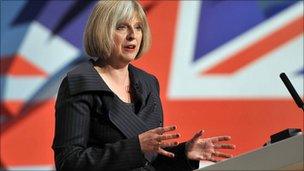Spouse English tests for migrants racist, court told
- Published

Theresa May: Policy designed to improve integration
Immigration rules requiring people to speak English before joining their spouse in the UK are racist, a lawyer appealing against the policy has said.
The High Court, sitting in Birmingham, was told that the tougher language tests discriminated against British-Indian families and their traditions.
The Home Office now requires anyone entering the UK to join their spouse to speak a minimum level of English.
Three couples are challenging the rules which were introduced in November 2010.
Rashida Chapti, a British citizen, has been married for almost 40 years to her husband, Vali. The couple have six children and have divided their time for 15 years between Leicester and India. His wife now wants him to move permanently to the UK, but Mr Chapti does not speak, read or write English.
The immigration rules introduced last year, external require Mr Chapti to show a basic knowledge of English before he can be given permission to stay.
The rules, originally approved by the former Labour government, apply to any spouse or civil partner, including prospective. People from countries where English is the majority language are exempt.
Manjit Gill QC, for the Chaptis, told the High Court that the rules breached their rights to a family life and constituted racial discrimination because they prevented a British citizen living with her husband purely because he was a foreign citizen who did not speak English.
"'The rule is designed, putting it crudely, to keep out persons who tend to marry within their communities, who tend to have arranged marriages, who tend to be from the Indian subcontinent and the Middle East in particular," said Mr Gill.
Mr Gill said that the Home Secretary may have a legitimate power to block someone's permanent settlement on the grounds that they were insufficiently integrated.
But he said the effect of the changes had been to prevent "mere residence" even though one half of the married couple was fully entitled to live in the country.
''That vice is compounded by the fact that the measure does this on grounds which are blatantly, admittedly, racially discriminatory.''
"Someone who is settled here, someone who is a British citizen, is ordinarily entitled to have their spouse living with them, providing it is a genuine marriage, providing there is no recourse to public funds," said Mr Gill.
"When one looks to see where are the sort of persons who are targeted by the rule, they are people of certain ethnic origins.
"There is a really powerful factor therefore operating here, that the discrimination is being drawn on grounds which are racially discriminatory in a pejorative sense.
Government officials last year said in an assessment of the policy, external that it could have a "disproportionate impact on certain nationalities or racial groups" but that any indirect discrimination would be justified because the policy would improve integration.
Speaking last year, Home Secretary Theresa May said spouses should have a basic command of English to help them settle in the UK.
"It is a privilege to come to the UK, and that is why I am committed to raising the bar for migrants and ensuring that those who benefit from being in Britain contribute to our society," said Mrs May.
The case continues.
- Published5 November 2010